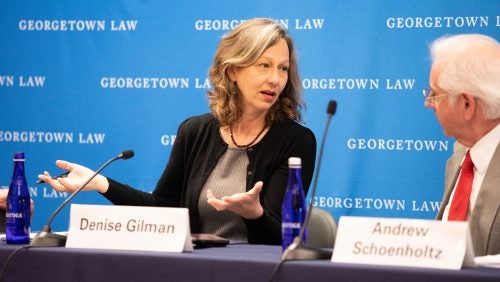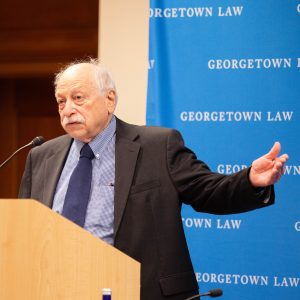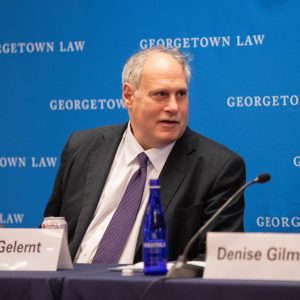Experts Defend Migrant and Refugee Rights at Georgetown Law Panel
March 27, 2025

Visiting faculty member Denise Gilman (left) and Professor from Practice Andrew Schoenholtz (right).
Faculty, students and legal advocates gathered at Georgetown Law on March 24 for “President Trump’s Immigration Policies and the Litigation Challenging Them,” a discussion of the new presidential administration’s activities on a range of immigration issues including detention, deportation and asylum.

Professor Philip Schrag moderated the discussion.
Moderated by Delaney Family Professor of Public Interest Law Philip Schrag, the panel was co-sponsored by Georgetown Law’s Human Rights Institute, Immigration Law Student Association, International Refugee Assistance Project (IRAP) and the Georgetown Immigration Law Journal.
“This is the battle of at least my lifetime — and probably many of your lifetimes — around basic conceptions of liberty and process and protection of human life and human dignity,” said Denise Gilman of the University of Texas School of Law, a visiting faculty member at the Center for Applied Legal Studies (CALS), the Law Center’s clinic representing asylum applicants. Gilman outlined the Trump administration’s expansion of detention and deportation efforts, including an increase in practices such as detention in remote facilities, which potentially limits individuals’ access to legal counsel.
‘Protection against persecution’
Georgetown Law faculty speakers were joined by ACLU Immigrants’ Rights Project Deputy Director Lee Gelernt, currently representing the plaintiffs in a case challenging the administration’s use of the Alien Enemies Act to carry out deportations.
The invocation of the 1798 law to deport Venezuelan migrants into detention in El Salvador earlier this month not only raises issues of statutory interpretation, Gelernt said, given the act’s intended use against foreign governments in wartime, but also raises concerns about a lack of due process for the individuals facing removal.

ACLU Immigrants’ Rights Project Deputy Director Lee Gelernt.
“The idea that the United States is not going to provide any means for people to apply for protection against persecution is really breathtaking,” he said, noting that the presidential administration has effectively eliminated all avenues for asylum seekers hoping to enter the U.S., even those facing religious persecution or other forms of grave risk in their home countries — an approach that breaks with longstanding norms. “After World War II, we said: ‘Never again would we send people back to danger.’”
CALS Co-Director and Professor from Practice Andrew Schoenholtz highlighted the separation-of-powers concerns arising from recent executive orders. With respect to the order that suspended the United States Refugee Admissions Program, he explained, a federal district court judge found that “[t]he presidential action effectively nullifies a congressionally established program, causing irreparable harm to vulnerable individuals and organizations.”
Some 12,000 vetted refugees already approved for admission and booked to travel to the United States had their travel cancelled by the State Department as a result of the order, Schoenholtz noted.
Centering ‘the human stories’
The discussion was followed by a question-and-answer session with attendees, who inquired about a range of issues including the status of student-visa holders and the role of civil society in rallying behind issues at the intersection of immigration and discrimination.
“Particularly for young people here, try not to get overwhelmed by the fact that the issues are so big,” Gelernt advised, urging students interested in immigration issues to mobilize through organizing, legal work and other advocacy efforts.
“Try as best you can to get the human stories out in some way or another,” he said. “Ultimately, that’s what’s going to move people.”